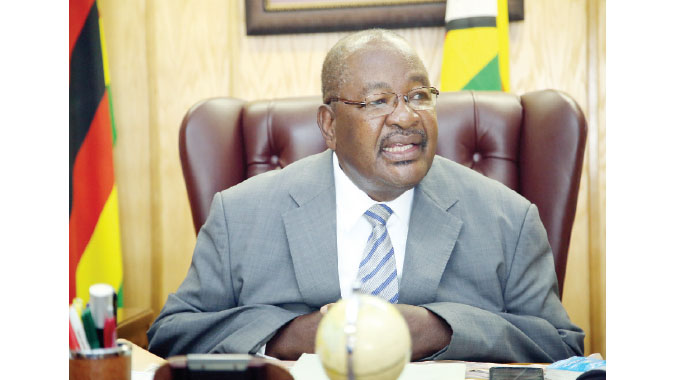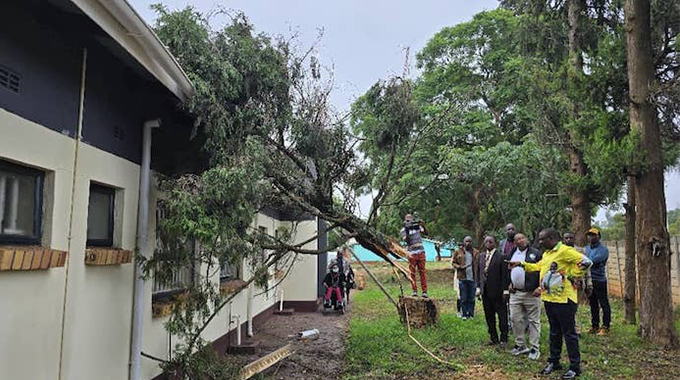Leather processing plant heralds industrialisation of Tsholotsho

Leonard Ncube,[email protected]
GOVERNMENT granted Local Board status to Tsholotsho early this year and already the wheels of industrialisation and development have started turning with a group of youths having established a leather processing plant to produce various products.
The project is in line with the rural industrialisation agenda. Through rural industrialisation, Government hopes to stem rural-to-urban migration, which saps growth from the African countryside, transferring it to towns and cities.
Rural industrialisation, which hinges on the Second Republic’s devolution policy, involves nurturing agro-processing start-up enterprises in rural areas through financial and technological support via venture capital funding and Government agencies.
With help from the Ministries of Youth, Sport, Arts and Recreation; Women Affairs, Community, Small and Medium Enterprises Development; Lands, Agriculture, Fisheries, Water and Rural Development, 18 young men and women aged between 18 and 30 have formed the Tsholotsho Leather Cluster.
The group underwent technical training in leather processing and shoe making. Bulawayo Leather Cluster and Plan International and other organisations funded the programme.
The youth got machinery from the Bulawayo Leather Cluster to set up a processing plant at Tsholotsho Centre and they are producing different kinds of shoes.
The development in Tsholotsho comes at a time when the leather cluster has continued to thrive, producing an array of products ranging from formal shoes, school shoes, sandals, leather bags and belts. The leather cluster is largely in
Bulawayo. In Matabeleland North, they have 10 sub-clusters in areas such as Binga, Hwange, Lupane, Tsholotsho, Nkayi, Bubi and Umguza.
Prior to the Covid-19 pandemic, the Bulawayo leather sector had secured markets in the region in countries such as Namibia, Zambia and Angola through participating at shows like the Zambia International Trade Fair in 2019, Windhoek Industrial and Agricultural Show (WIAS) in Namibia and Zimbabwe International Trade Fair (ZITF) as players sought to improve on quality standards.
The US$2 million funding availed by the African Development Bank under the Beef and Leather Value Chain Technical Assistance to the Bulawayo Leather Cluster could go a long way in boosting capacity.
The Common Market for Eastern and Southern Africa (Comesa) acknowledged Zimbabwe’s leather cluster had shown resilience and defied all odds during the Covid-19 era when together with the textiles sector recorded over US$36 600 in profits on goods produced during that period.
During the Covid-19 era, the cluster produced goods worth US$20 000 with Namibia being one of their export destinations for school shoes. If supported, Tsholotsho could grow into an export source in the leather cluster.
Tsholotsho Leather Cluster secretary Ms Andile Moyo said processes to formally register a company are underway while production started a few months ago. They are already supplying schools and communities in Tsholotsho.
“We are developing a company named Tsholotsho Leather Cluster after we were trained by the Bulawayo Leather Cluster. We went through a short course of five weeks and then we started the company in March,” she said.
“We received equipment and because of the skills we had acquired we couldn’t wait to start production. Our products are original.”
Ms Moyo said local farmers supply them with hides while other raw materials such as synthetic material, textiles, rubber and foam are sourced from Bulawayo. The hides are tanned in Bulawayo.
“We realised there was an opportunity in Tsholotsho as there is no competition. We are the first firm since Tsholotsho got town status and we thought we couldn’t sit on our laurels yet we had skills to empower ourselves,” she said.
“An idle mind is the devil’s workshop. Youths need to be empowered so that they don’t end up resorting to crime, drug and substance abuse, teenage pregnancies and early marriages.”Tsholotsho is synonymous with a high number of youths migrating to South Africa soon after school.

Ms Andile Moyo at work making shoes at Tsholotsho Leather Cluster factory
“The leather cluster seeks to provide employment and promote reverse migration for development of the district,” said Ms Moyo.
Presently, the shoes are sold in Tsholotsho at Cut Price Shop which has offered to help market the products beyond the country’s borders.
“We produce our products from scratch as we design them ourselves. We literally have every department from acquiring raw materials to cutting and finishing such as putting shoe laces,” said Ms Moyo.
“We produce between 15 and 30 pairs per day depending on orders placed. Our ultimate goal is to be self-reliant and fend for our families.”
The group’s treasurer Ms Musawenkosi Mathambo said their major markets are schools and non-governmental organisations supporting vulnerable children.
“This business will transform our lives and the community already feels empowered because we buy hides from local farmers. We want to employ youth, provide jobs to the community, and uplift livelihoods,” she said.
“We are grateful to Government for this opportunity which will put Tsholotsho on the world map. We look forward to more similar opportunities because a number of youths cross to South Africa to look for employment.”–@ncubeleon












Comments